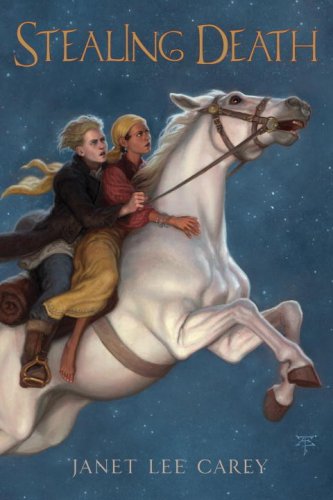
 Stealing Death by Janet Lee Carey
Stealing Death by Janet Lee Carey
Stealing Death by Janet Lee Carey is a book I really wanted to like. It has an unusual YA setting — a desert land of red sandstone and small villages; a great premise — a young boy (Kipp) who steals the sack Death uses to collect souls so no more have to die; an exciting, emotional beginning with all but one of Kipp’s family killed in a fire; and a pattern of inserting small folktales into the larger narrative.
But for all that I wanted to love this book, and for all its emotional weight of theme and character — death, guilt, love, family responsibility, aging — it had a curiously removed feel to it. Part of it was that once we had followed Kipp from the fire that left him with only his little sister to the new fields he was forced to work to when he steals the sack of the Gwali (death-catcher), the book becomes very episodic as Kipp is chased by the Gwali from spot to spot. The world of the book rushes by relatively quickly, with little solid place sense. It’s an original setting, as mentioned, but the land isn’t fully mined for its potential. It feels a bit sketchy. The same is partially true of Kipp’s movements, some of which didn’t seem to really advance story or character all that much. His love interest, the daughter of a rich landowner and thus out of Kipp’s reach, I felt was more a hindrance to the story than a help. Without her we could have focused much more on Kipp’s desperation over the death of his family and responsibility to his sister, a unique and powerful narrative. Instead, we end up with a relatively common story: the lower-class boy and the upper-class girl forbidden to love and you can fill in the rest. (Well, most of it. Carey does throw the relationship for a major twist early on, but it mostly repeats earlier themes and motivations rather than adds to them.)
Kipp is a three-dimensional character, mostly well drawn, but the supporting characters are less so. His sister, his love interest, the landowner — none of them truly come alive in rich, individual fashion. They aren’t stock or caricature, but they just don’t have the spark of life to them. It’s somewhat telling that Soar Joy, an old man who was once Kipp’s mentor, comes alive more in Kipp’s memories than most of the characters Kipp meets in the flesh.
Part of the reason for that is Joy is associated with the tales of the Escuayans. These old folktales, such as the story of Gwali and his soul sack, are where Carey really shines — they feel like truly ancient tales and whenever we dip into them, no matter how briefly, the book feels like it jumps up in richness of style and tone and atmosphere, as if the writer is most fully engaged in those moments. I would have happily spent more time immersed in those tales.
Stealing Death’s close has some moving moments, and the themes of life and death are brought forward in strong fashion. While the story is fully resolved by the end, it also seems clear Carey isn’t finished with these characters yet (or at least, doesn’t have to be). While Stealing Death is mostly just solid, I’d be interested to see another book by this author set in this world, one that spends a bit more time on the world and its characters. The potential is there, even if it’s not fully met in Stealing Death.



I really like her style, so I’m definitely planning on reading this one.